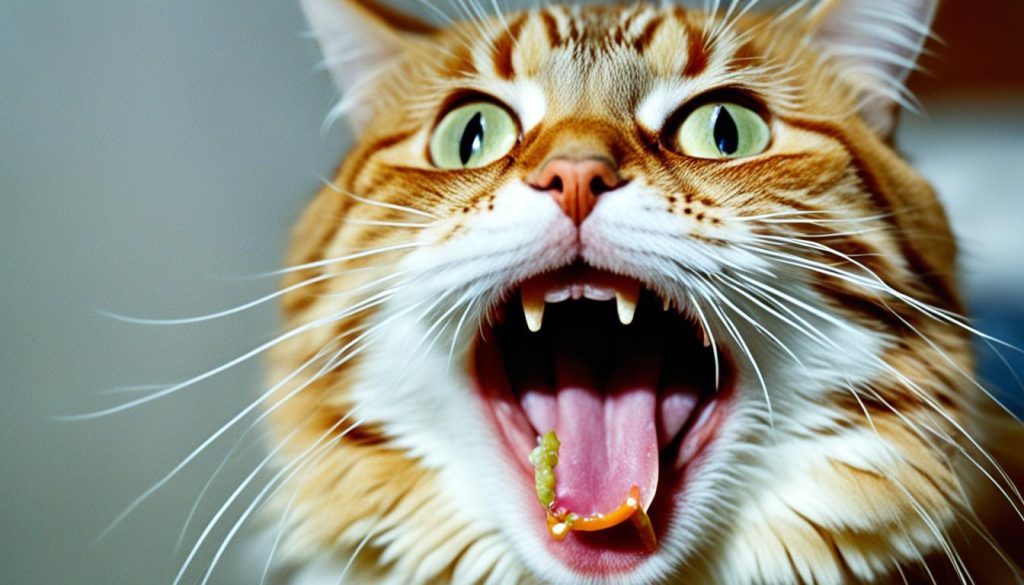For many pet owners, witnessing their feline friends gag at food can be both puzzling and concerning. As responsible pet guardians, it’s crucial to discern the normalcy of such behavior and recognize when it could be symptomatic of a deeper issue. This exploration into feline gagging aims to demystify the instances of cats gagging at food, walking you through various scenarios where your cat’s gagging is a mere quirk or a red flag warranting veterinary attention. Understanding why cats gag at food is not only a step toward better pet care but also pivotal in nurturing their well-being.
Key Takeaways
- Recognizing normal vs. abnormal feline gagging
- Identifying common triggers for gagging in cats
- Ensuring prompt intervention for sustained gagging behavior
- Knowing when to consult a veterinarian for a gagging cat
- Understanding the potential health risks associated with feline gagging
Common Causes of Gagging in Feline Dietary Behavior
When it comes to our feline companions, understanding the quirks of their dietary habits is key to ensuring their wellbeing. One perplexing behavior that can scare any pet owner is when their cat begins to gag. While this occurrence might be acute or sporadic, it is important to understand its potential causes, which range from grooming routines to diet and beyond.
Hairballs and Grooming Habits
The infamous hairball is often the culprit behind a cat’s gagging. Hairballs in cats form due to their meticulous feline grooming habits, during which they inevitably swallow hair. While their digestive system is typically adept at handling this fur, hairballs can occasionally form and cause discomfort or gagging as the cat attempts to regurgitate them.
Food Intolerances and Allergies
Just like humans, cats can suffer from food intolerances and cat allergies. These can manifest through various symptoms including gastrointestinal upset, of which gagging is a common sign. Identifying these food sensitivities often requires careful observation and sometimes a process of elimination or veterinary guidance to ensure our feline friends are not only eating a nutritious diet but one that agrees with their unique digestive systems.
Ingestion of Foreign Objects
Cats are curious creatures and sometimes their exploration leads to the ingestion of foreign objects. Whether it’s a piece of a toy or a stray piece of yarn, these items can cause obstruction or irritation in the throat, leading to gagging. Keeping a close eye on your cat’s playtime and promptly removing any damaged toys can help prevent these situations.
Each of these issues can be distressing for both the cat and the owner, but with proper understanding and swift action, they can often be prevented or managed. Regular grooming, especially for long-haired breeds, can minimize hairball formation. Being vigilant about diet and providing safe toys can curb other potential causes of gagging.
Why Do Cats Gag at Food: Analyzing the Gag Reflex
When a cat’s dinner routine turns into a series of coughs and gags, pet owners are rightly concerned about their feline friend’s health. Understanding the nuances of a cat’s gag reflex and the behaviors that trigger this reflex such as overeating in cats or eating too fast in cats, as well as their response to toxins, is crucial in ensuring the wellbeing of these cherished companions.

Overeating and Eating Too Fast
Cats that consume their food too quickly or indulge in overeating can experience gagging due to the sheer volume of food overwhelming their digestive systems. This hurried consumption can disrupt the normal swallowing process, triggering the feline gag reflex.
- Preventing overeating in cats by controlling portion sizes and meal frequency
- Using puzzle feeders to slow down fast eaters and reduce the risk of gagging
Responses to Toxins and Foreign Materials
Cats possess a sensitive vomeronasal system that can elicit a strong feline gag reflex in response to toxins in cats or the ingestion of inedible foreign materials. In their environment, this serves as a protection mechanism, aiding cats in avoiding potentially harmful substances.
- Assessing household plants and other items for cat safety
- Providing toys and chews that do not pose a choking or gagging hazard
Understanding the Feline Gag Reflex
The feline gag reflex is a natural, protective response, and occasional gagging can be considered normal. However, owners should observe their cat’s behavior for signs of distress or consistent gagging, as this might indicate more serious health concerns that require veterinary attention.
- Maintaining regular vet checkups to monitor cat health
- Noting changes in eating behaviors that could point to gagging disorders
Health Concerns Related to Frequent Gagging in Cats
Encountering your feline companion gagging once in a while is not unusual, but should you notice frequent gagging in cats, it’s crucial to turn your attention to what’s happening beneath the surface. Persistent gagging can be a red flag for a variety of health concerns in cats. Serious conditions such as systemic diseases, which impact multiple organs and tissues, or specific heart diseases, could manifest as repeated gagging episodes. The consistent presence of such symptoms demands a thorough examination by a veterinarian.
Cat health issues are diverse and can be challenging to diagnose without professional insight. Tumors, whether benign or malignant, can obstruct a cat’s digestive tract or respiratory pathways, leading to attempts to clear the obstruction through gagging. Moreover, afflictions involving the esophagus, such as esophagitis or motility disorders, may also stimulate persistent gagging as cats struggle to process their food appropriately.
For cat owners, it is integral to monitor the frequency and intensity of any gagging. If this behavior becomes a regular occurrence or is accompanied by distress, lethargy, or weight loss, seeking veterinary care becomes imperative. Timely intervention can make a significant difference, not just in managing symptoms but also in addressing any underlying conditions before they progress further. Gagging might be a common reflex, but when it’s part of an ongoing pattern, it’s a symptom that should not be ignored.


